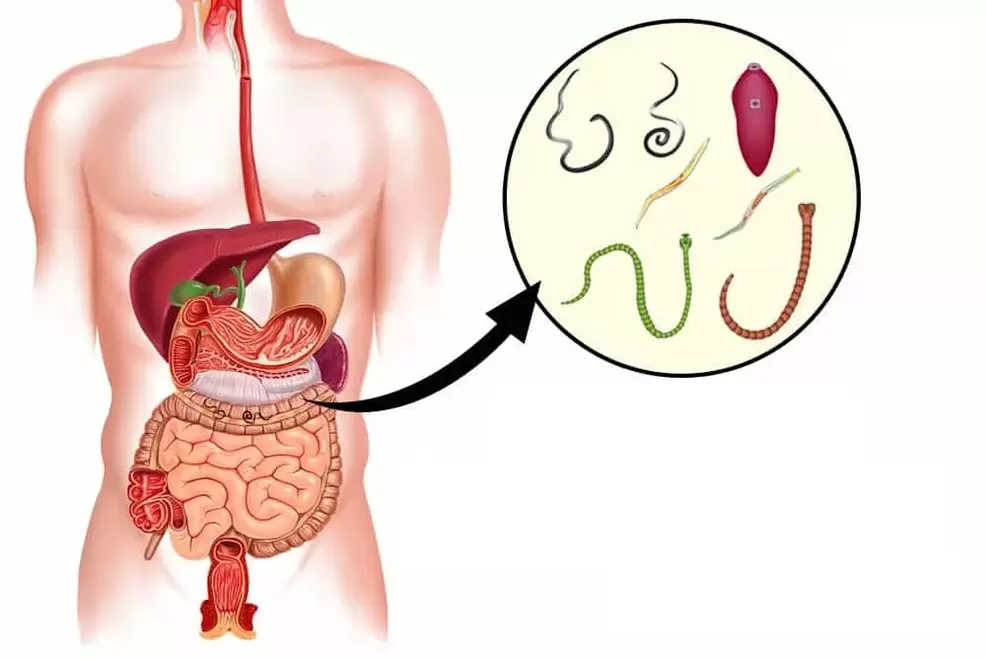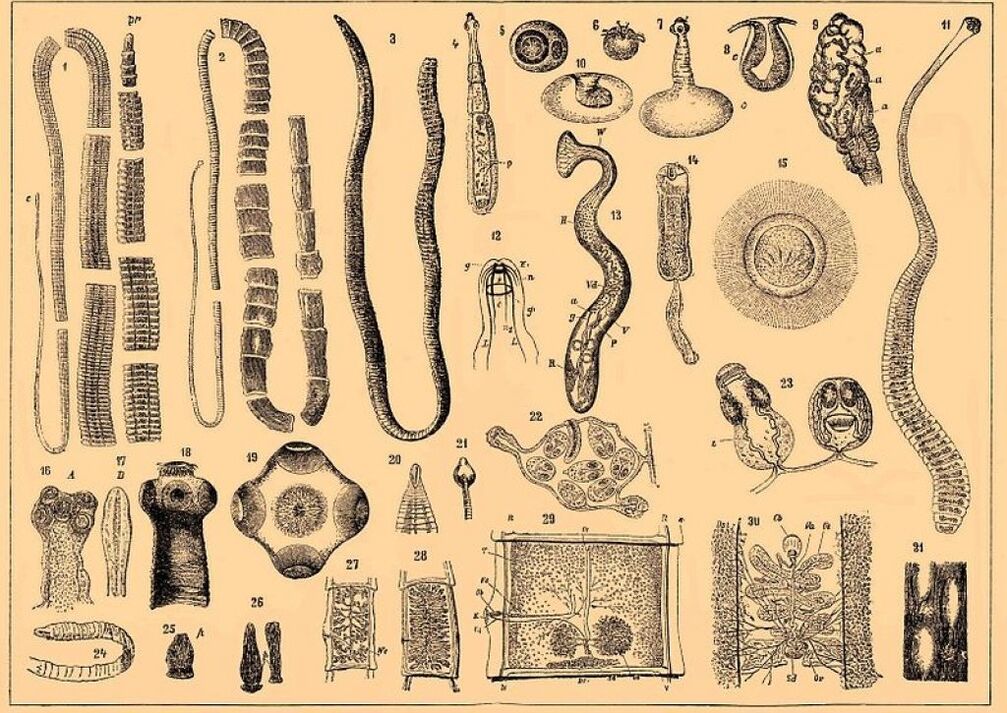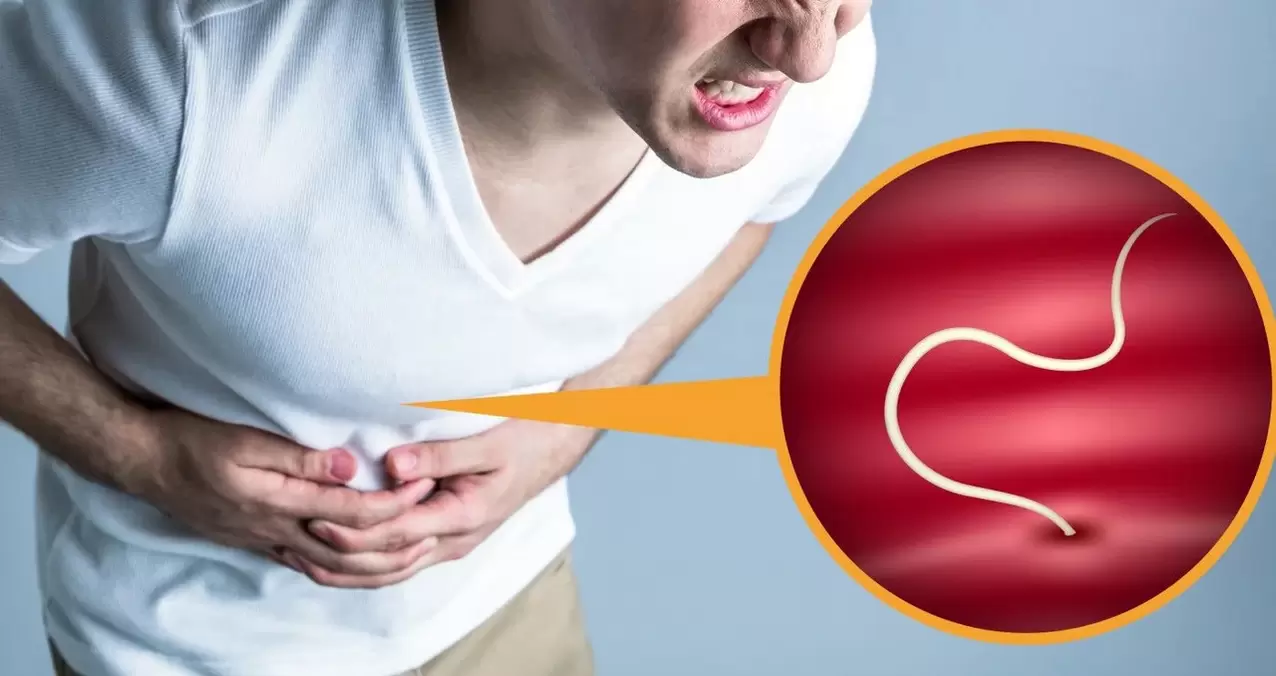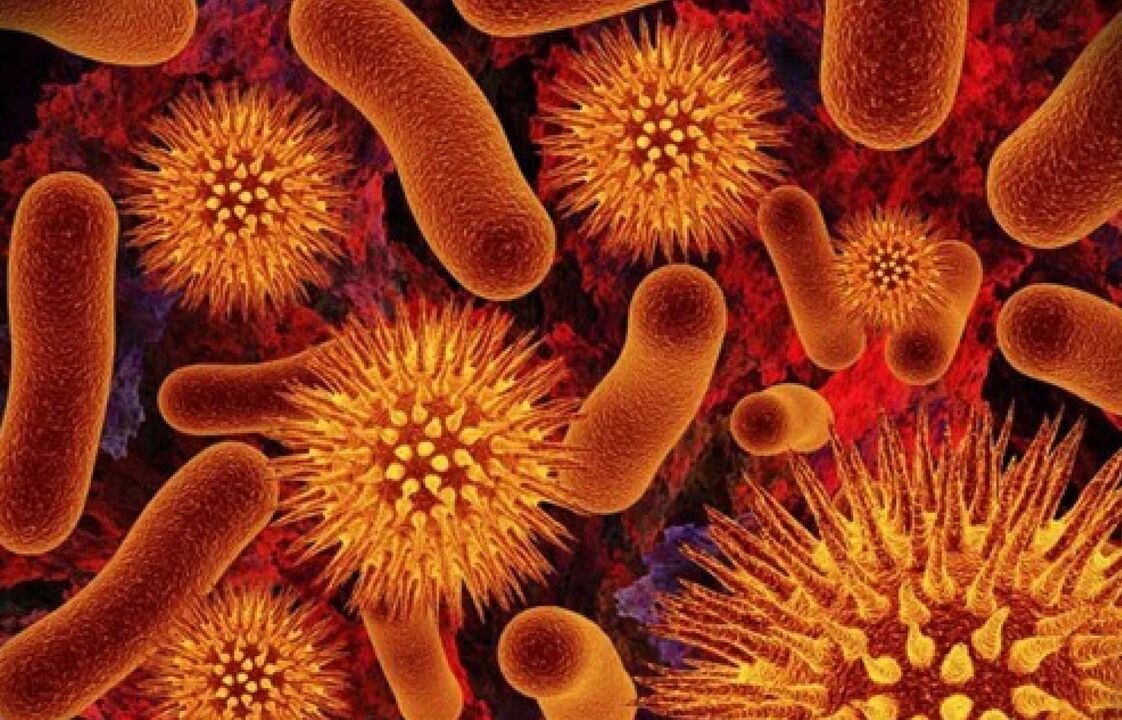Deterioration of health can be observed not only from infections that penetrate the body.
Parasites and worms can also cause weakness, frailty and fragmentation. They can lead to many of the consequences that people usually assume for the manifestation of a normal inflammatory process.
What is helminthiasis? And what symptoms does it show in the human body?
The answers are quite simple.
Helminths are parasitic, roundworms and tapeworms, as well as their bright representatives are roundworms, pinworms, bovine tapeworms, tapeworms and many others. No doubt many encountered them as children or adults.
The disease, dubbed helminthiasis, is the result of the effects and activities of helminths on the body.
Infection with worms

Parasites can enter a person's body in a number of ways, both unnecessarily cleansed and uninterested in their health. There are enough of them.
Think about what helminths look like in a healthy body:
- normal hand squeezing. The easiest way for a parasite to reach a new homeowner. They enter the skin first and then the blood through the upper layers of the epidermis. This transmission method also works when in contact with stray stray animals and touching other people's belongings. Thanks to the good blood circulation of a healthy person, it is not difficult to reach the goal and find themselves in the chosen place of future residence;
- through water. Many helminths are perfectly protected as fresh and even as larvae in seawater. Don't forget the village's wells and water pipes. They are not overly sensitive. You also need to be careful when visiting swimming pools, baths and saunas. Perhaps they are poorly developed;
- moist soil and sand. The eggs of many worm species come out in the feces and fall on these surfaces. It is easy to get infected in suburban areas and even in children's sandboxes;
- low quality products. These often include seafood, fruits and vegetables, eggs and milk, cottage cheese;
- places where people gather en masse. Supermarkets, shops, pharmacies and hospitals. This is where many people grab doors, shelves, packaged products and handles every day. And not all of them are healthy. Don't forget the dirt that enters these rooms during rainy and humid times;
- Insects pose a threat in summer and autumn. Mosquitoes and flies can carry small microscopic eggs, even with their paws.
To this list of the appearance of helminthic infestation in adults and children can be added non-compliance with the basic rules of personal hygiene.
Which helminths can be infected

There are many parasites. And they all enter the body in different ways, move inside and affect specific organs. Some of them choose a single host, while others spend their entire lives with different carriers.
Humans can observe several basic isolated parasites in their bodies:
- The most common roundworms are nematodes. Small white individuals. Reaches 40 mm. Everyone knows roundworms, pinworms, whipworms, and tropical guinea worms. They live in the intestines, lay eggs in the anus, and are often excreted in the feces. Detection of helminth infestation by nematodes is very simple and unanalyzed;
- parasitic tapeworms are larger and more dangerous. Reaching 10 meters, they migrate and enter almost all vital organs and systems. There have been cases of suffocation after the parasite's movements with the respiratory system. Adult animal tapeworm, manifests itself with tapeworm;
- trematodes, flukes. They are unpretentious to the environment, so they penetrate the body through both soil and water. They travel in the human body and are easy to see. This is mainly the area of the eyes and eyelids. They destroy not only the intestinal microflora, but also the tissues of other organs. Toxic effects cause depletion of the body.
Of course, it is impossible to independently determine which helminth a person has. Only the method of examination of the worms and the type of complete examination and subsequent treatment are determined, and in case of recovery, prophylaxis is prescribed.
Signs of parasites in the body
If helminths enter the body, you cannot immediately identify them with signs of infection. Some appear only after a certain time.
However, all the symptoms of adult worms are very serious and continue at first glance for no reason:
- a sharp rise in temperature to the level of the inflammatory process. Typically between 37. 6 ° C and 38 ° C;
- nausea, vomiting;
- aching pain in the abdomen and navel;
- possible redness of the skin;
- weakness, drowsiness, fatigue;
- involuntary grinding of teeth at night;
- dry persistent cough and shortness of breath;
- violation of normal stool. diarrhea or constipation;
- itching in the anus;
- getting a yellowish or very pale skin tone;
- discomfort in muscles and joints.
It is not immediately possible to make an accurate diagnosis based on such symptoms. However, in humans, helminths only show symptoms that correspond to the damaged organs. And this is the liver, which usually has intestines, bronchi and kidneys.
Symptoms of helminthiasis

Late detection of parasites can lead to more complex consequences:
- sharp decline in immunity. As a result, the ability of any infection and virus to enter the body;
- urticaria, bronchial asthma, as a result of constant poisoning by parasites. The discharge of worms causes a serious allergy in the body;
- severe hair loss, eyelashes;
- unexplained brittle nails;
- tooth decay, enamel gradually disappears;
- heavy bleeding of the gums;
- nervousness, mental disorders.
In humans, worms not only show signs of infection, but also cause many diseases, aggravate the course of existing diseases, and therefore treatment of parasites is mandatory.
It is better to conduct a timely examination and begin the full removal of helminths from the body.
Diseases caused by parasites

The characteristic signs of helminthic infestation indicate that the body has been exposed to severe toxic effects or has already damaged many organs and systems:
- disorders of the gastrointestinal tract. Because most helminths choose this place for more growth and development. It is expressed in intestinal obstruction, dysbacteriosis, diarrhea, pancreatitis;
- respiratory problems. Each migration of the parasite constantly carries it to the bronchi and lungs. It often causes spasms, pneumonia;
- the central nervous system suffers. Migraine, dizziness, loss of orientation in space, nervousness and depression;
- increase in the spleen, liver, decrease in bile flow;
- inadequate functioning of the urinary system. Urethritis, cystitis;
- problems with the reproductive organs. Vaginitis, inflammatory processes in the uterus, vagina, ovaries. Possible sexually transmitted infection.
These are severe symptoms caused by helminths. If you care about your health, you must consult a doctor. Any of the presented symptoms forces the specialist to appoint a special examination.
The most common blood test will show that parasites have formed in the body. When hemoglobin values are less than 100 g / l, an increase in the number of eosinophils by more than 6%, an increase in leukocytes by more than 9%, and a decrease in erythrocytes by 3 g / l or less.
Also, a sharp decrease in protein and an increase in immunoglobulins, which is characteristic of allergies, should be noted by a specialist.
Parasitic diseases and their symptoms
Depending on the type and class of worms, the symptoms of helminth infection have received individual names that distinguish them from each other. For professionals, this classification facilitates subsequent treatment, recovery, and prevention.
ascariasis. Of course, it shows the symptoms of the ascaris parasite and possible concomitant diseases. Often not observed immediately, but 2 weeks after the helminths enter the body.
Symptoms are similar to a general cough, acute bronchitis, mild allergies. It is mixed with a common infection, because it is accompanied by all the above features and fever. There may be changes in the lymph nodes.
With advanced chronic ascariasis, all symptoms are complicated. Blood pressure jumps, anorexia, anorexia with constant abdominal pain may appear. Persistent vomiting, fecal disorders. The face becomes pale, healthy skin color disappears, dark circles and puffiness appear. Poor sleep at night or its complete absence becomes a habit. Small white worms are visualized in the feces.
Penetration of pinworms or enterobiasis. It often occurs in young children due to non-compliance with the rules of personal hygiene. The infection often occurs as a result of itching in the anus. Pinworms appear periodically. At intervals of 1-2 days. When parasites enter, the body's reaction will be involuntary gnashing of teeth at night, poor intermittent sleep. It is not particularly dangerous and does not cause pain.
Worms, like worms, bring opisthorchiasis with them. The acute course of the disease lasts up to 8 weeks. During this period, there is an increase in body temperature, heaviness and swelling, diarrhea and a feeling of inflammation. With chronic exposure to flukes, the symptoms also spread to the respiratory tract, causing severe allergies to the central nervous system.
Tapeworm parasites cause many consequences of their presence in the human body. Extensive tapeworm can disrupt the pancreas, causing intestinal obstruction, vitamin B12 deficiency, decreased hemoglobin, and anemia. Similarly, all representatives of tapeworms cause pain syndromes in the abdominal cavity, bloating and nausea.
Giardiasis. These parasites are present in small numbers in the human body. But they are normally safe. With exacerbation, their level rises. It causes nausea, abdominal pain, bloating and stool disorders due to vomiting, liver and stomach disorders.
Of course, such symptoms of helminthiasis must be treated and completely prevented.




































